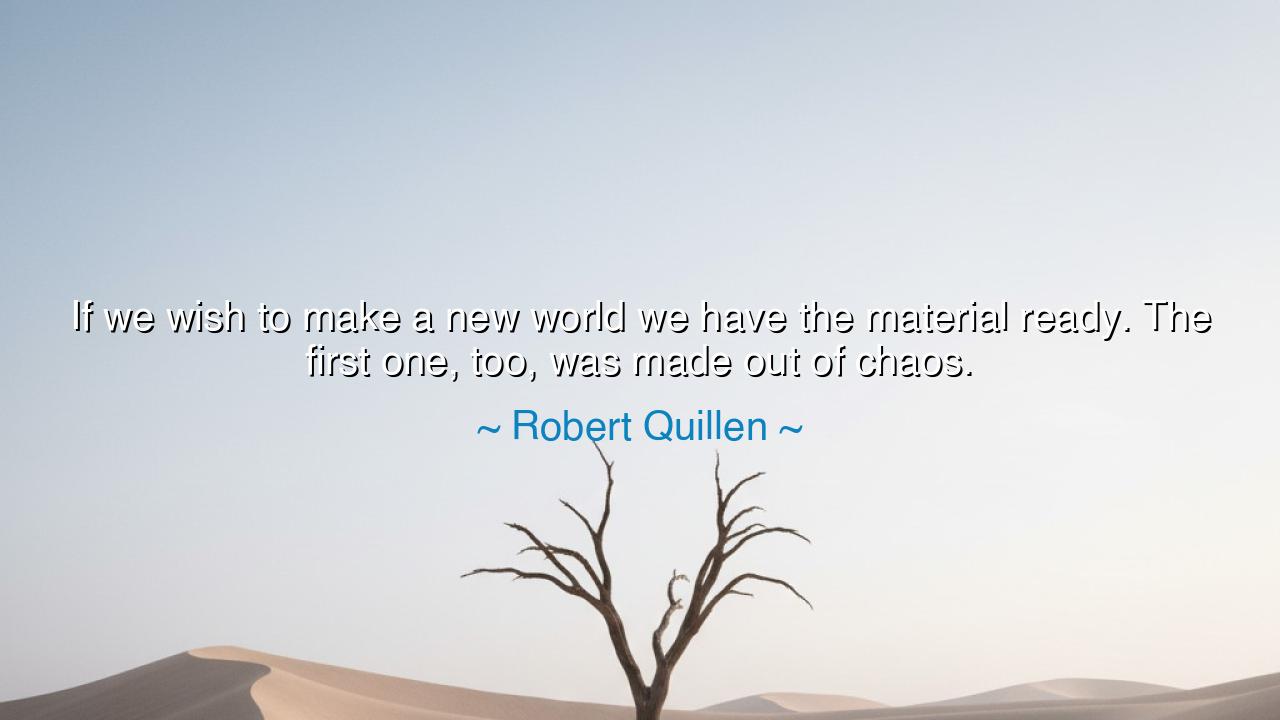
If we wish to make a new world we have the material ready. The
If we wish to make a new world we have the material ready. The first one, too, was made out of chaos.






Robert Quillen, with a vision both poetic and prophetic, once declared: “If we wish to make a new world we have the material ready. The first one, too, was made out of chaos.” These words are like fire struck from stone, reminding us that creation is not born from ease and order, but from storm and ruin. The ancients themselves spoke of Chaos as the formless void from which the gods shaped heaven and earth. Quillen calls us back to this truth: that out of confusion, destruction, and disorder, mankind holds within its hands the raw substance to forge anew.
To the fearful, chaos seems an enemy—a flood that drowns, a fire that consumes, a darkness without pattern. But to the wise, it is the primal clay. From chaos, the first world was born; from chaos, galaxies swirled, stars ignited, and life itself sprang forth from waters untamed. If the gods of old could mold creation from nothingness, then we too, heirs of the divine spark, can shape hope from despair, order from turmoil, and a new world from the ruins of the old.
History itself testifies to this eternal rhythm. Consider the aftermath of the Second World War. Cities lay in ashes, nations shattered, millions mourning. To many, it seemed the end of civilization. Yet from this chaos arose new beginnings: the United Nations was formed, new charters of peace and human rights were proclaimed, Europe rebuilt itself from rubble into prosperity, and former enemies became allies. What was once ruin became the fertile ground for renewal. Chaos was not the end—it was the beginning of another world.
The same story can be seen in the birth of nations. When thirteen colonies rose in rebellion against the British Crown, their world was thrown into chaos—uncertain, bloody, perilous. Yet from that upheaval came the founding of the United States, a new vision of liberty and governance. The revolution’s disorder was the material from which new order was forged. Again, Quillen’s words shine: chaos is not a void to be feared, but a workshop in which the future is hammered into shape.
And so we see: every personal struggle, every collapse of certainty, every loss that leaves us trembling is also a seedbed of creation. The breaking of old patterns makes space for new forms. A man who loses his fortune may discover his purpose. A society torn by unrest may awaken to justice long denied. A soul shattered by grief may find compassion deep enough to heal others. The key is to recognize chaos not as finality, but as the raw material of transformation.
What, then, shall we learn from Quillen? That we must not despair when the world is in disorder, nor when our lives fall into confusion. Instead, we must gather the fragments, take up the raw stone of chaos, and dare to shape it into something greater. The material is always ready—it waits in every storm, every upheaval, every ending. What matters is whether we have the courage to lift our hands and create.
So I say unto you, seekers of renewal: do not curse the chaos of your days. Embrace it, for it is the soil from which new life grows. When your world falls apart, see not only the wreckage, but also the building blocks hidden within it. When nations tremble, do not sink into despair, but ask: what new world can we forge from this? For if the first world was born from chaos, so too may every new one be. And the power to create rests, as always, in the hearts of those who dare.






AAdministratorAdministrator
Welcome, honored guests. Please leave a comment, we will respond soon